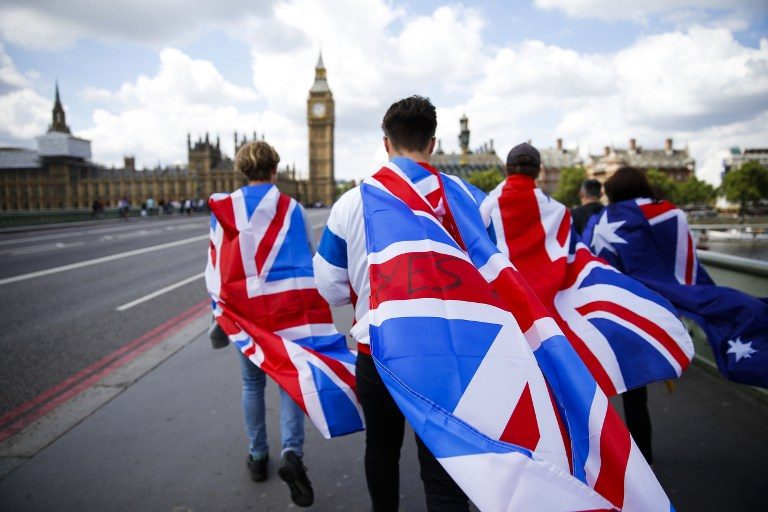SUMMARY
This is AI generated summarization, which may have errors. For context, always refer to the full article.

LONDON, United Kingdom – Britain’s political crisis deepened Sunday, June 26, amid party infighting in London and new polls showing bolstered support for Scottish independence, even as EU leaders seek a quick divorce after a seismic vote to leave the bloc.
Prime Minister David Cameron will meet with his cabinet Monday, June 27, and parliament will reconvene, 4 days after the shock Brexit vote which plunged the bloc and global financial markets into unprecedented turmoil.
Finance minister George Osborne will make an early morning speech to try to steady markets, while US Secretary of State John Kerry is due in London and Brussels for crisis talks and the leaders of Germany, France and Italy will meet in Berlin.
Three days after Cameron announced his resignation after losing last Thursday’s (June 23) referendum, opposition Labour leader Jeremy Corbyn is also facing pressure to stand down, with a string of his top team resigning Sunday.
EU powers have called for a swift divorce amid fears of a domino effect of exit votes in eurosceptic member states that could imperil the integrity of the 28-nation alliance.
European Parliament chief Martin Schulz warned Sunday that a period of limbo would “lead to even more insecurity and thus endanger jobs” and said a summit of EU leaders Tuesday, which Cameron will attend, was the “right time” to begin exit proceedings.
But Cameron has said negotiations on Britain’s departure must wait until a successor is chosen from his Conservative party, which could be as late as October.
German Chancellor Angela Merkel, who will host French President Francois Hollande, Italian premier Matteo Renzi and EU President Donald Tusk on Monday, has said there is “no reason to be nasty in the negotiations”.
On Sunday Hollande and Merkel confirmed they were in “full agreement on how to handle the situation” French presidency sources said after a phone call between the two leaders.
Both heads of state “want the greatest clarity to avoid any uncertainty,” and “stressed the need for European initiatives and the need to act quickly on concrete priorities,” one source told Agence France-Presse.
Kerry meanwhile, during a stopover in Rome on Sunday, expressed regret at Britain’s decision to become the first EU nation to leave the bloc – and vowed Washington would maintain close ties with the 28-country alliance.
“Brexit and the changes that are now being thought through have to be thought through in the context of the interests and values that bind us together with the EU,” he said.
Boost for Scottish independence
Britons cast aside warnings of isolation and economic disaster to vote 52% to 48% in favor of quitting the EU in Thursday’s referendum.
The vote wiped $2.1 trillion from global equity markets Friday, June 24, and sent the pound plunging 10 percent amid fears of a new threat to the global economy.
All eyes are on market reaction on Monday. British finance minister Osborne is due to make a statement at 7 am local time (0600 GMT) to steady nerves in the global financial hub.
The historic vote, fought on the battlefronts of the economy and immigration, exposed deep divisions in the country, which were particularly keenly felt in Scotland.
Scotland voted by 62% to stay in the EU, and the prospect of being pulled out against their will has renewed support for a second independence referendum, less than two years after they chose to stay in the United Kingdom in a referendum in September 2014.
“The UK that Scotland voted to stay in in 2014 does not exist any more,” First Minister and Scottish National Party leader Nicola Sturgeon told BBC television Sunday.
Two polls on Sunday put support for Scottish independence at 59% and 52% respectively. In the 2014 referendum, 55% voted against it.
Sturgeon has said a second independence vote was now “highly likely”, and a meeting of her cabinet on Saturday, June 25, agreed to start drawing up the necessary legislation.
Labour revolt
In London, likely candidates to succeed Cameron, including Brexit campaigner and former London mayor Boris Johnson, began sounding out support over the weekend.
The referendum decision has also lit a fuse under disgruntled members of the Labour party, many of whom have been unhappy with Corbyn’s leadership since he took office last September.
The party leadership had campaigned to stay in the EU, but critics accuse Corbyn of failing to reach out to working-class voters drawn in by the “Leave” camp’s anti-establishment rhetoric.
After a symbolic vote of no confidence was proposed on Friday against Corbyn, he sacked foreign affairs spokesman Hilary Benn late Saturday for challenging his leadership.
That decision sparked a string of resignations among members of the shadow cabinet. By Sunday evening 10 members of Corby’s top team had quit.
But allies of the veteran socialist said he had no plans to step down.
“He was elected nine months ago, the biggest mandate of any political leader in our country, and he is not going anywhere,” Labour’s finance spokesman John McDonnell told the BBC.
The motion of no confidence is expected to be discussed at a meeting of the parliamentary Labour party on Monday.
Any challenger would need the support of 20% of the party’s 229 MPs and it would then be put to party members. – Rappler.com
Add a comment
How does this make you feel?
![[ANALYSIS] A new advocacy in race to financial literacy](https://www.rappler.com/tachyon/2024/04/advocacy-race-financial-literacy-April-19-2024.jpg?resize=257%2C257&crop_strategy=attention)


![[In This Economy] Can the PH become an upper-middle income country within this lifetime?](https://www.rappler.com/tachyon/2024/04/tl-ph-upper-income-country-04052024.jpg?resize=257%2C257&crop=295px%2C0px%2C720px%2C720px)

There are no comments yet. Add your comment to start the conversation.